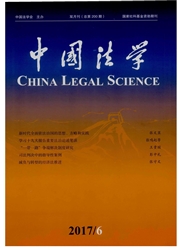

 中文摘要:
中文摘要:
财税法在不同国家形态下、不同社会时期中表现出不同的功能,而且在重要历史节点中往往也发挥着推动甚至是决定性的作用,二者呈现出交相辉映的互动态势。过去,社会多关注财税法的经济功能,尤其是强调其中的宏观调控功能。在“四个全面”的新阶段,应当从国家治理现代化的高度来完整地认识财税法的功能,由此才能更好地推动我国的法学学科整体发展和法治事业进步。在“跳出财税法看财税法”的检视下,财税法功能在范围上涵摄经济、社会、政治各方面,在立场上则由“权力本位”转向“权利本位”、从“管理”转向“法治”、从“治民之法”转向“治权之法”。具体来说,财税法具有规范理财行为、促进社会公平、保障经济发展三大功能,它们三位一体、协同发力,统一于实现国家长治久安的宏伟目标中。
 英文摘要:
英文摘要:
Fiscal and taxation law exhibits different functions in different country forms and different social periods, and it often plays a promotion or even decisive role in the historical node, while both of these functions show an interactive tendency of supplementing each other. In the past, people attached much importance to the economic function of fiscal and taxation law, especially to the macro-control function. In the new phase of " Four Comprehensives", we should comprehensively understand functions of fiscal and taxation law from the perspective of the modernization governing of the state to better promote the overall development of the law subject as well as the advancement of rule of law. With the stereoscopic view of "viewing the fiscal and tax law as an outsider", functions of fiscal and taxation law cover economic, social, political, and other aspects, while its position has changed from "power-oriented" to "right-oriented", from "management" to "governance" and from the "law of ruling people" to the "law of ruling power". Specifically, the fiscal and taxation law has functions of standardizing financial behaviors, promoting social justice and ensuring economic development, and these three functions combine a trinity with collaborative force and are united in the grand goal of achieving long-term stability of the country.
 同期刊论文项目
同期刊论文项目
 同项目期刊论文
同项目期刊论文
 期刊信息
期刊信息
